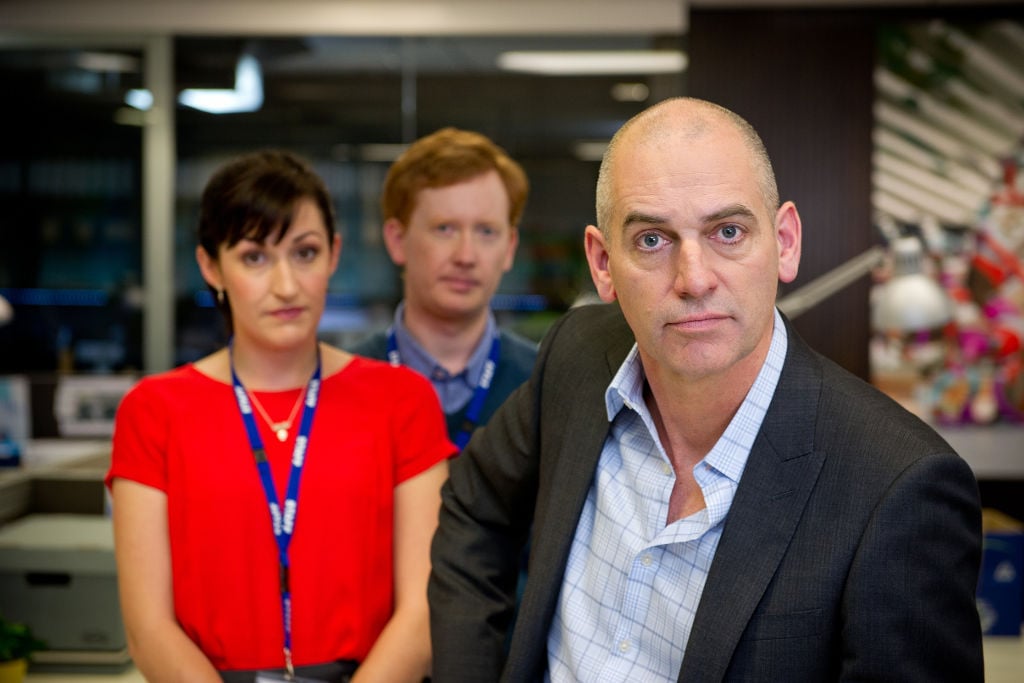We Spoke To Rob Sitch About ‘Utopia’, Satire, And How The Government Wastes Your Money
The follow-up to 'Frontline' and 'The Hollowmen' just landed on the ABC, to speak truth to power and the public service.

Last week, our very own Nation Building Authority handed over a metric buttpile of cash for a new logo — only to immediately revert to old branding, amid claims the design was plagiarised. In the very same week, Junkee has learned bureaucrats from the new government office physically swapped laptops to read emails sent to one-another during an intranet outage.
Okay, so none of that stuff is real. But maybe I had you going there for a second? That’s the genius behind new political satire Utopia: it’s frighteningly close to the lumbering antics of our actual government.
Written and produced by Australian comedy legends Rob Sitch, Santo Cilauro and Tom Gleisner, the show is being hailed as the third part in an unofficial series by Working Dog, a production house formed in 1993. The trilogy began with legendary 1990s satire Frontline, which skewered current affairs “journalism” for its exploitative and shallow practices, before 2008’s The Hollowmen, which focused on the inner workings of the prime ministerial office.
Utopia, which premiered on the ABC last Wednesday, follows perpetually harassed office manager Tony (Sitch), and his team of mostly ham-fisted public servants, who make up the fictional Nation Building Authority. They spend millions on planning new roads, rail lines, airports and high-rise urban developments, while achieving almost nothing, constantly distracted by political machinations, and continually derailed by government liaison guy Jim (Anthony “Lehmo” Lehmann) and public relations whizz Rhonda (Kitty Flanagan), who are fixated on slogans and public opinion.
Visionary long-term plans driven by knee-jerk reactions and an obsession with tomorrow’s front page… Sound familiar?
A Series Inspired By Gluten-free Muffins
Needless to say, the everyday workings of Australia’s real-life government organisations provided an inspirational goldmine. While researching the show, Sitch and his team chatted to a bunch of people involved in the political process, from public servants to property developers, and unearthed some astonishingly absurd stories.
Like the government office that for months specially ordered in gluten-free muffins, before realising the employee that needed them had left; management promptly called a meeting on the important topic of whether gluten could therefore be removed from the blacklist. Let’s hope a Celiac didn’t start work the next day, sending the place into some sort of gluten death spiral.
“Utopia started life as an examination of modern absurdities,” Sitch says. “Prosperous societies manage to find new and fresh ways of converting good intentions into amusing and unintended screw-ups all the time.”
Building A Nation… Of White Elephants
Utopia’s writers noticed “nation building” had worked its way into modern political lexicon, as politicians of all ilk repeatedly announced unplanned and uncosted yet wildly grandiose infrastructure projects, seemingly planned on the back of envelopes still stained with the residue of last night’s whisky lobotomy. (Think recent criticism by former government finance head Mike Keating of Tony Abbott’s extra $58 billion for projects that haven’t been properly costed. Also, maybe, the entire NBN.) Thus, Utopia and its entertaining exploration of well-designed white elephants was born.
Often, Sitch says, finding inspiration was as easy as picking up a newspaper. “It’s rarely one incident. It has to be something systemic — and you can pick that up from the front pages of the papers. The key is to match what people say and what people do. That’s probably the best bullshit detector of all.”
Utopia highlights how an obsession with image rather than substance can knee-cap otherwise worthwhile projects. “Public life is marinated in marketing terms,” says Sitch. “Media management and marketing techniques used to be called propaganda. That term has a very troubling history over recent centuries, but now it seems to be a force unto itself …. like HAL in 2001 A Space Odyssey. The machine needs to be fed. Edward Snowden revealed many secrets, but possibly the most troubling one was that the ‘marketing’ no longer matches the truth.”
The Power Of Satire
For their impressive body of work, Sitch and fellow Working Dog creatives Tom Gleisner, Jane Kennedy, Santo Cilauro and Michael Hirsh were last week named among Australian television’s 75 most powerful people. Which made me wonder: does caustic comedy that highlights and ridicules the absurdity of real life actually have power, beyond entertainment?
“I find trying to make something good is still really difficult; I emerge from the process feeling anything but powerful!” Sitch says. “Producing change is multi-factorial. No one likes being made fun of, especially if it’s accurate. Personally I admire investigative journalists. That’s something that definitely works.”
–
Utopia screens on Wednesdays at 8.30pm, on the ABC — and the entire Frontline series was released for free last month on YouTube. You’re welcome.
–
Koren Helbig is an Australian freelance writer living in Spain. She has written for New Internationalist, Frankie, Kill Your Darlings and The Lifted Brow, blogs at The Little Green House, and tweets @KorenHelbig.